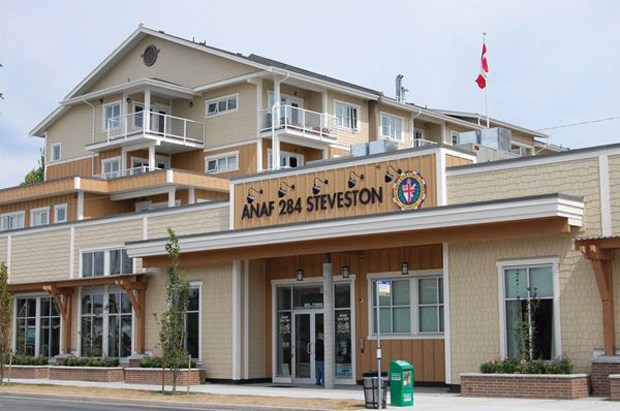The countdown clock is ticking to July 1, 2015 in Steveston, but it’s not for the annual Salmon Festival celebrations.
The calendar watching is being done by officials at the ANAF 284 (Army, Navy & Air Force) club and the Canada Day zero hour is the deadline to submit payment of it’s municipal tax bill which the veterans’ association says is putting the organization into serious debt unless it can get a tax exemption from the city.
Sharon Boyce, the unit’s secretary told the News the ANAF has struggled in past years to meet the bill, which for the last tax year totalled $64,614.56
That was covered by a loan from a private source under the condition a business management company be hired to revamp the club’s bar and lounge operations to start providing an adequate revenue stream to meet all of its financial obligations.
While that revamping is underway, the financial turnaround isn’t expected for at least another year. The concern is how ANAF 284 will continue operating until then.
“The management firm has done extensive work so far in formulating a business plan and making changes to how the business is run. The hope is that the changes will get the ANAF on solid footing and operating profitably,” said Boyce in an email. “The problem is that change is gradual and whether they can or cannot meet next year’s taxes will again be anyone’s guess.”
Boyce said that previously, assets have been sold — an adjacent parcel of land was liquidated a few years back — to cover any shortfalls. But with no more assets to tap into, the fear is ANAF 284 could be facing a financial crisis as early as mid-2015.
The organization cannot enlist financial support from its adjacent, 144-unit seniors’ housing facility, the Maple Residences, which was built at the rear of its property and opened in 2012 as part of a $36 million re-development project.
Boyce said the Steveston 284 Seniors Housing Society, which runs The Maple Residences, is a not-for-profit organization and a registered charity. As such, it is unable to allocate funds to the ANAF club, which is also a not-for-profit organization.
However, the housing society has a 60-year lease with ANAF that pays for the clubhouse’s portion of the mortgage.
Still, even without that monthly expense, and a membership of around 1,300, ANAF has run into money problems.
“Without that loan to cover last year’s taxes, the ANAF would have had to shut its doors last August,” said Boyce, adding that a tax exempt status from the city is way out of the red ink.
It’s a road tried back in 2006 when re-development of the site was first being considered. Back then, city council denied the request. That has ANAF 284 president Dave Gurney puzzled since some other veterans’ associations and community groups in B.C. do not pay municipal taxes.
“When you have the Richmond Lawn Bowling Club having an exemption, I don’t see why a veterans’ club can’t get it,” he said, adding veterans’ associations play an important role in returning a great deal of funds through donations to charities and community groups.
Concerns over municipal tax bills are also shared by those legion branches that have not been able to get exempt status.
“They absolutely threaten the continued existence of some of them,” said Inga Krause, executive director of the Royal Canadian Legion, BC/Yukon Command.
Currently, the legion is going to bat for a long list of branches to get a tax break or exemption with Richmond’s #291 on Bridgeport Road in the top five being put forward.
That location had a city tax bill of around $22,000 last year, Krause said.
“That’s quite a lot to pay,” she said, adding it contributes to a slow, but steady decline of the financial viability of legions which are prevented from using funds raised by annual Remembrance Day poppy sales to cover operating costs of clubhouses.



